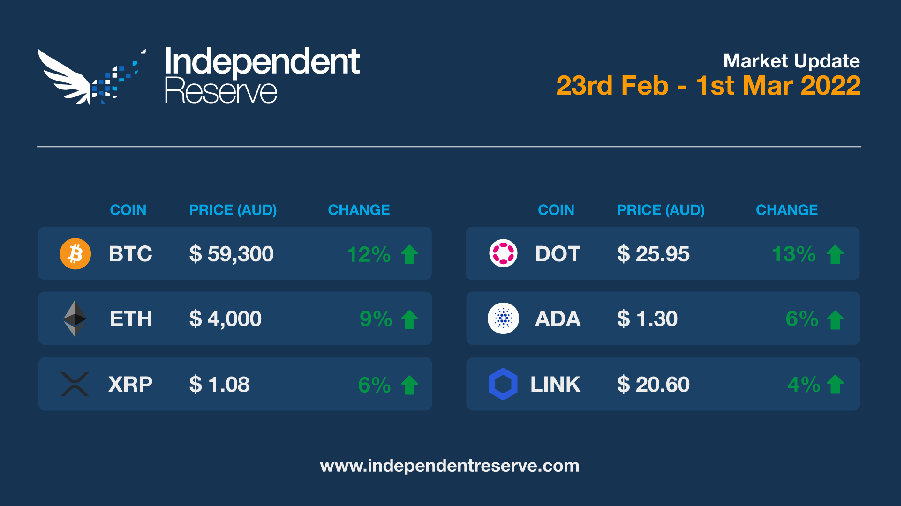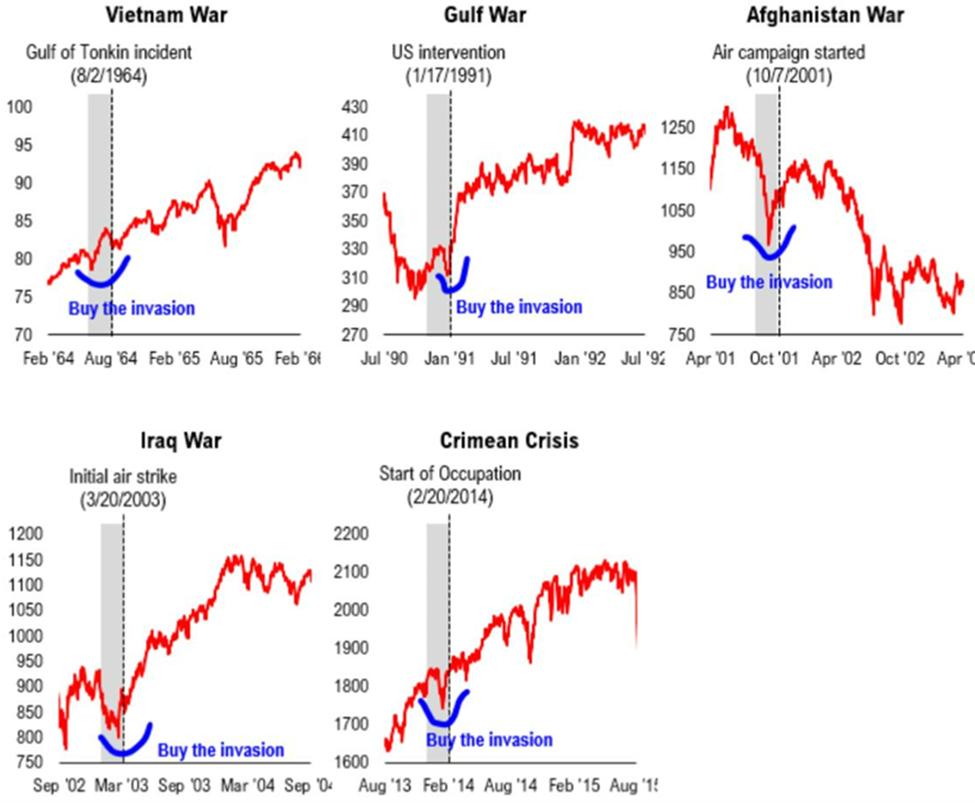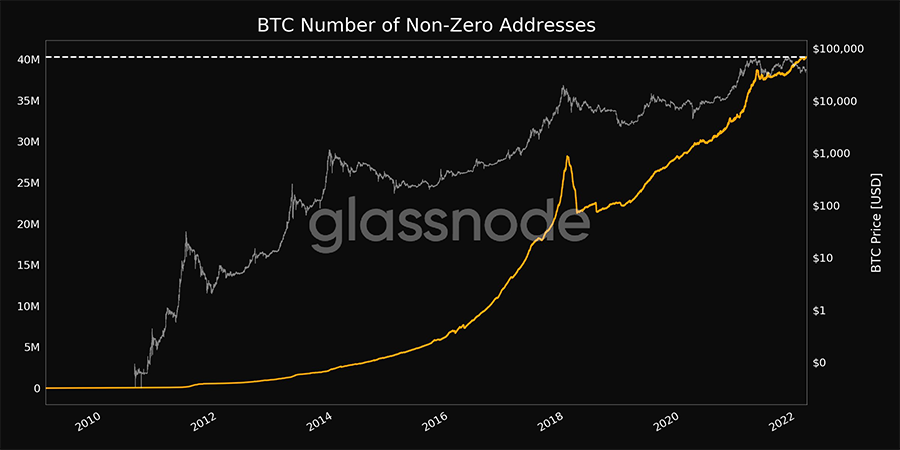In Markets
Bitcoin went on a rollercoaster ride this week, plunging more than 10% on the news that Russia had invaded Ukraine. It bottomed out below AU$48,000 (US$34K), recovered a little bit as markets digested the implications, and then suddenly jumped almost 15% in the past 24 hours to AU$59,300 (US$43K). As usual, the reasons aren’t exactly clear but there are reports Russians are buying up crypto as the country’s financial system gets hit hard by sanctions. Markets also seem to prefer certainty to uncertainty and news emerged today that eBay is looking at adding crypto payments. Bitcoin is up 12% for the week at the time of writing, with everything else up too including Ethereum (9%), XRP (6%), Cardano (6%), and Polkadot (13%). The Crypto Fear and Greed Index is at 20, or Extreme Fear. Bitcoin dominance is edging back towards 44%, the highest it’s been since November, and there are now 800K wallets with at least one whole Bitcoin, and non-zero addresses are at an all-time high above 40 million.

In Headlines
Finance on the frontlines
Perhaps the wars of the future will be fought in cyberspace and on financial markets rather than with tanks and bombs. That seems to be the strategy of the west in response to the invasion of Ukraine. Russian banks have been cut from the SWIFT cross-border transfer system, sending its financial system into turmoil. The stock market was suspended, interest rates hit 20% and the Ruble collapsed in value by more than one-third. No one is entirely sure of the ramifications of cutting Russia from SWIFT, with various pundits predicting bank runs in Russia, USD becoming superseded as the world’s reserve currency, or alternatively getting even stronger. China’s alternative Cross-Border Inter-Bank Payment System or Russia’s SPFS could emerge as viable alternatives to SWIFT. However, fears that crypto will be used to bypass international sanctions led European Central Bank President Christine Lagarde to urge the European Union to quickly approve new crypto regulations to prevent that from happening. As it happens, The Bank of Russia has actually just resumed buying gold.
Crypto donations flood in
The Ukrainian government has received more than US$20 million (AU$27.5M) in crypto donations after it released wallet addresses via Twitter. This bypasses the threat of being blocked by fiat crowdfunding sites like Patreon, which kicked off Ukrainian NGO Come Back Alive for funneling money to the military.
“Buy the invasion”
It’s about as tacky a slogan as you can think of, but it’s one crypto asset manager Grayscale has embraced in its latest report for investors. The analysts looked at the historical market moves after invasions in Vietnam, the Gulf War, and Afghanistan and argued the certainty of an invasion helped markets recover from the uncertainty in the lead up. “History suggests that odds favor a stock rally after an invasion,” it said. “Crypto assets and stocks have had a high correlation that may continue and boost crypto prices.” It released a bunch of charts showing the turnaround labeled “buy the invasion”.

Source: Grayscale
Freeze the accounts
After freezing US$8 million (AU$11M) in the bank accounts of more than 200 people connected to the Freedom Convoy protests, Canadian Prime Minister Justin Trudeau declared the “emergency” was over and the Emergencies Act that gave him the power to do so would be revoked. This came after signs the Senate wouldn’t support the use of the Act.
Shoe size of carbon footprint increases
A new study published in the peer-reviewed scientific journal Joules found that Bitcoin’s carbon footprint actually increased by 17% in the wake of China’s mining ban. It attributed this to the use of hydroelectric power in China, and the much greater use of gas in America and coal in Kazakhstan. According to the report, only 25% of the network runs on renewables, which is less than the 45% last August and much less than the almost 60% claimed by the Bitcoin Mining Council (whose figure is pretty rubbery and based on self-reported data from mostly US-based miners). A proposal before the EU seeking to ban Proof of Work mining was postponed this week but will no doubt be resurrected. The Massachusetts Institute of Technology (MIT) also included the more climate-friendly Proof-of-Stake (PoS) consensus algorithm to be adopted by Ethereum on its 2022 technological breakthroughs list.
SEC to lose Ripple case?
Joseph Hall, a former managing executive for policy at the SEC, has predicted the regulator has a good chance of losing its US$1.3 billion (AU$1.8B) lawsuit against Ripple for selling unregistered securities. “The SEC has a lot riding” on the case, he told podcaster Tony Edward and “their entire regulatory project could be basically shut down if they lose on the merits … And I continue to think there is a pretty good chance that [the SEC] will lose on the merits.”
BTC addresses with a positive balance hit an all-time high
Throughout February, on-chain data has shown that the supply metrics of the Bitcoin network are continuing to show strong adoption. There are now more addresses with a positive BTC balance than ever before, hitting an all-time high of 40 million addresses. Additionally, these wallets are increasingly HODLing their coins, with the amount of BTC circulating supply that last moved between three and five years ago reaching a four-year high of just over 2.8 million BTC, according to Glassnode.

Source: Glassnode
TVL in DeFi shows strength
According to Defi Llama, the total value locked (TVL) in DeFi recently touched above US$200 billion, as crypto markets find support from last week’s downturn. Several native assets from the US$611 billion worth of smart contract protocols have seen double-digit gains in the sector. Ethereum dominance, in terms of the TVL in DeFi today, is around 55% with the current TVL being US$112.36 billion.
Until next week, happy trading!


